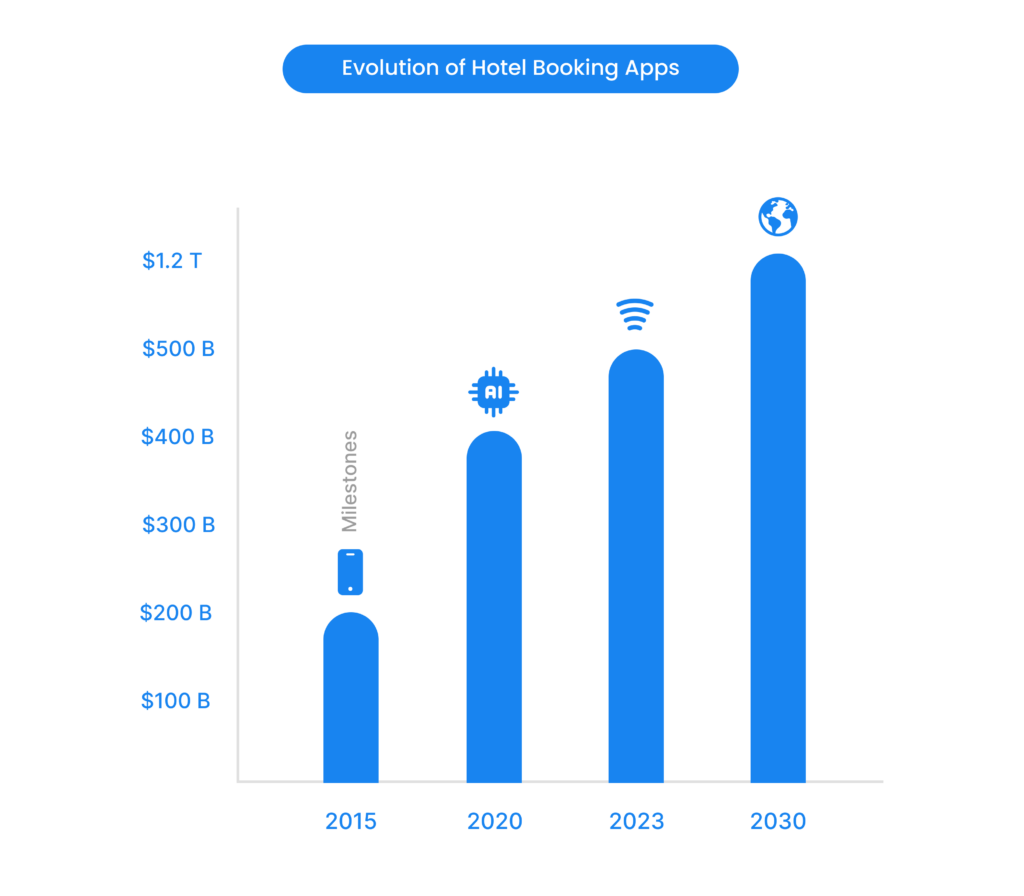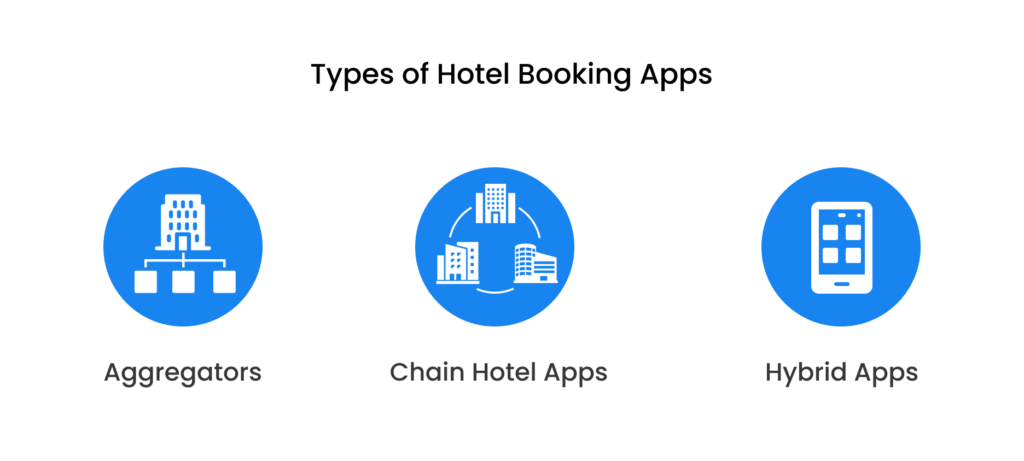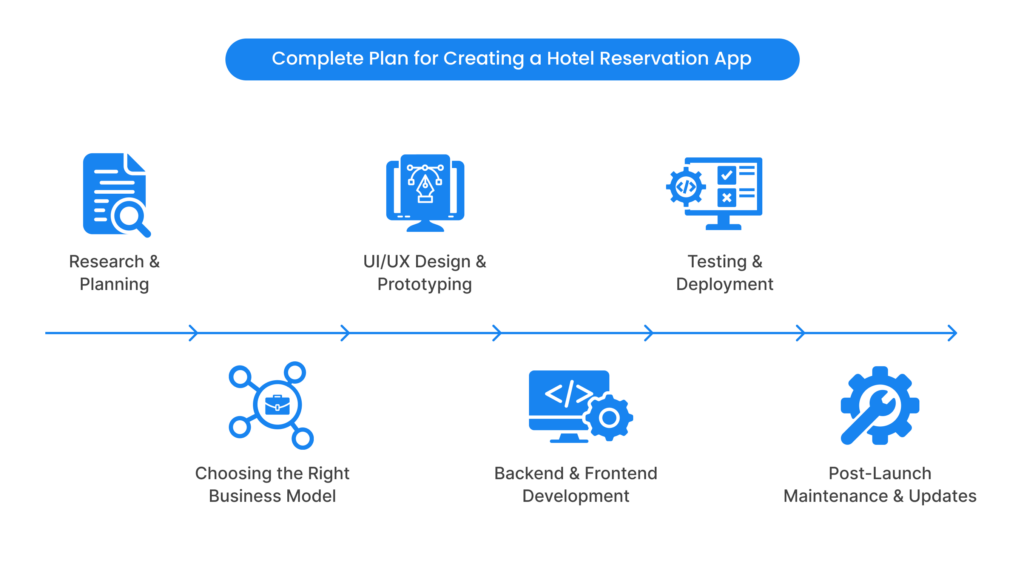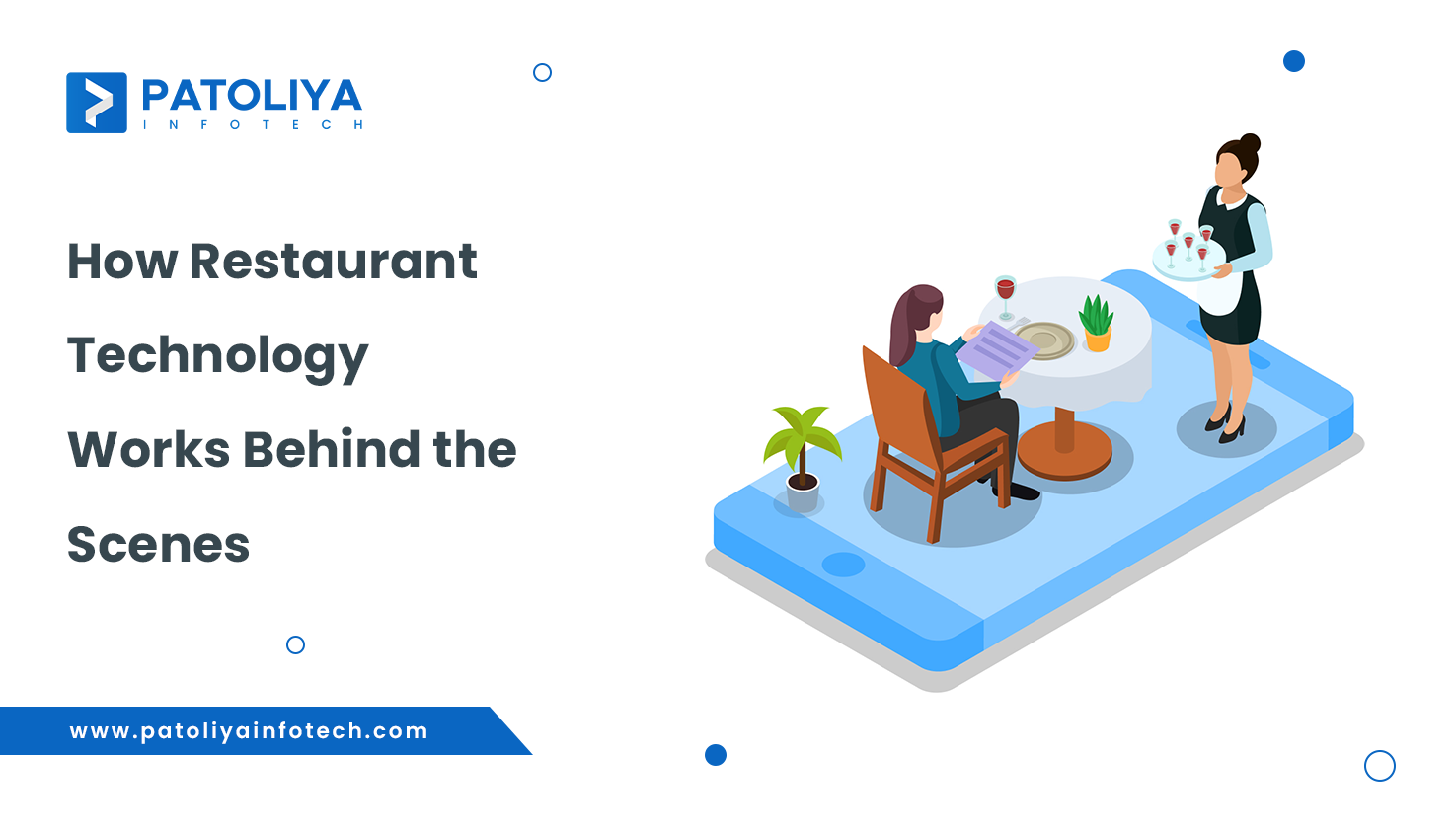How Hotel Booking App Development Works for You

Table of Contents
The resort reservation app business is expanding and changing the way people travel and make lodge reservations. It is no longer simply a trend. There has never been a greater need for user-friendly, frictionless resort reservation applications, since the worldwide online travel industry is expected to reach $1,091 billion by 2032, growing at a CAGR of 9.2% (Allied industry Research, 2023).
With travelers increasingly placing a higher value on expediency, security, and instant access to information, the epidemic has accelerated the transition from traditional booking methods to online platforms.
Apps for booking hotels are becoming more than simply a luxury; both guests and hotel operators need them. With only a few touches, users of these applications can book stays, read reviews, and compare costs. They provide hotel operators a direct line of communication with their customers, lessen reliance on other platforms, and increase profits with customized promotions and reward schemes.
But why does this market provide investors and business owners such high profits? First, it is anticipated that the hotel business would recover and reach pre-pandemic levels, with revenue reaching $550 billion by 2026 (Statista, 2023).
According to Think with Google (2023), 60% of hotel reservations are now done through mobile devices, making mobile applications the driving force behind this rise. Millennials and Gen Z are the ones driving this change since they want mobile-first solutions and want a smooth, mobile booking experience.
Staying ahead of the curve is more important than simply tapping into an expanding sector when you invest in hotel booking app development. Modern hotel booking applications can provide hyper-personalized experiences, predictive analytics, and real-time availability thanks to developments in AI, machine learning, and data analytics.

This gives enterprises a competitive edge. Additionally, the emergence of virtual tours, contactless check-ins, and integrated payment gateways has raised consumer expectations even more, making innovation a crucial factor in this industry's success.
When it comes to investing in modern generation and user-centric design, the lodge booking app industry is a real jackpot. Now may be the ideal moment for any business, whether it is a startup or an established player, to take advantage of this growing need and design an app that not only meets but far beyond user expectations. Apps for hotel reservations are setting the standard for the virtual travel of the future.
Types of Hotel Booking Apps
These days, one length does not fit all when it comes to hotel reservation app enhancement. The type of application you decide to develop will be determined by your long-term goals, business model, and target market. A summary of the three main categories of lodge booking applications that have the potential to take over the industry is provided below:
1. Hotel Booking Aggregators
The Swiss Army knives of the travel industry are hotel reservation aggregators. Vacationers may use these applications as a one-stop shop to compare rates, services, and reviews across hundreds of hotels and reservation platforms. Examples include major players in the market like Booking.Com, Expedia, and Agoda.
- How They Work: Hotels, online travel agencies (OTAs), and even private property owners are among the many sources of data that aggregators collect from. Using user choices like price, location, and ratings, they employ algorithms to show the best possibilities.
- Why They’re Popular: The ease of evaluating several alternatives in one location is often favored by tourists. Being featured on these networks may greatly boost a business's exposure and bookings.
- Revenue Model: Commissions from hotels, advertising, and premium listings are the usual sources of income for aggregators.
- Market Trend: 40% of all internet hotel reservations are anticipated to be made through aggregators by 2025 (Phocuswright, 2023). Their appeal stems from tourists' increasing need for choice and transparency.
2. Apps for Chain Hotels
Apps for chain lodges are made for independent resort operators like Marriott, Hilton, and Hyatt. When devoted consumers choose to make direct reservations with their preferred companies, these apps serve them.
- How They Work: From booking to testing, these applications aim to give users an uninterrupted experience. Features like contactless check-in, room personalization, and loyalty apps are frequently included.
- Why They’re Popular: Direct reservations made using chain lodging applications help producers keep more income and reduce reliance on 1/3-celebration platforms. These applications provide users access to special benefits including discounts, lost enhancements, and praise factors.
- Revenue Model: Direct reservations, upselling (such as dining packages and accommodation upgrades), and loyalty app subscriptions are the sources of income.
- Market Trend: Chain lodge applications are evolving quickly, and by 2025, 55% of hoteliers intend to increase their spending in the direct booking age (Hospitality Technology, 2023). This change is being driven by the need to lower charge rates and build stronger customer connections.
3. Hybrid Hotel Room Booking Apps
Hybrid applications combine the best features of chain hotel apps and aggregators. Although they allow independent motels or small chains to display their residences, they also provide a variety of hotel listings from other sources.
- How They Work: From travelers on a budget to those looking for luxury, these applications serve a wide spectrum of users. Frequently, they include specific elements like last-minute deals, local tales, and carefully chosen travel packages.
- Why They’re Popular: Hybrid applications use flexibility and range to captivate a wider target audience. They are particularly well-known among independent hotels and boutique homes that wish to reach a larger audience without sacrificing their individuality.
- Revenue Model: Among the sources of income include commissions, hotel subscription fees, and partnerships with local businesses (such as restaurants and excursions).
- Market Trend: Travelers who appreciate personalized and authentic tales, such as Gen Z and millennials, are the primary consumers of the hybrid model. 25% of the net lodge reservation market is expected to be accounted for by hybrid applications by 2025 (Skift, 2023).

Which Type Should You Choose?
Your business objectives will determine what kind of hotel booking software you arise:
- If you want to reach a global audience and offer a wide range of options, aggregators are the greatest option.
- For established companies looking to foster customer loyalty and reduce reliance on third parties, chain hotel apps are ideal.
- If you need to serve a diverse audience while supporting unbiased hotels and particular residences, hybrid apps are a great option.
There are opportunities and obstacles unique to each type, but one thing is certain: the market for resort booking apps is ready for innovation. By understanding these models, you may develop an app that proudly stands out in a competitive landscape while also satisfying consumer demands.
Business Models for Hotel Booking Apps
The success of your hotel reservation software depends on selecting the appropriate commercial enterprise issue. The version you select will dictate how you make money, attract people, and sustain long-term development. The five most well-known business models for hotel booking applications are looked at here, along with their benefits, drawbacks, and real-world situations.
- Commission-Based Model
The most popular revenue model in the hotel booking industry is the commission-based variant. This version allows apps like Booking.Com and Expedia to operate and earn a percentage of each reservation made via their platform.
- How It Works: Hotels, resorts, and other lodges have partnerships with the app and list their homes there. The platform collects a fee (usually between 10% and 25%) for each reservation booked using the app.
- Pros:
- Excellent sales skills, especially when dealing with a huge customer base.
- The software is more appealing because there are no upfront costs for users.
- Cons:
- Heavy dependence on collaborations with lodging facilities.
- Strong resistance from many commission-based organizations.
- Best For: Hybrid applications and aggregators that list several residences.
- Market Trend: Sixty percent of all OTA (Online Travel Agency) revenue comes from commission-based models (Phocuswright, 2023).
- Subscription Model
Users can access premium services or exclusive deals through the subscription model in return for a regular fee. Apps with subscription-based features, such as HotelTonight, have been tested.
- How It Works: Customers pay a monthly or yearly fee to get features including priority customer assistance, easier cancellations, and reduced pricing.
- Pros:
- Regular, predictable sales flow.
- Promotes retention and loyalty.
- Cons:
- Needs a compelling pricing offer to persuade them to pay.
- May limit the acquisition of users due to the barrier.
- Best For: Apps targeted audiences with luxury or regular travelers.
- Market Trend: With a 15% compound annual growth rate, subscription-based tour services are expected to reach $1.8 billion by 2025 (Grand View Research, 2023).
- Freemium Model
The freemium business model charges for more advanced features while providing basic services for free. This concept is well-known for apps that aim to build a sizable user base before turning a profit.
- How It Works: Basic booking features are free for users, but premium features like personalized recommendations, trip insurance, or other offers require payment.
- Pros:
- Attracts a large number of users quickly.
- Before purchasing the app's features, users may test it out.
- Cons:
- Free users may have little conversion costs to premium users.
- Need constant innovation in order to keep people interested.
- Best For: Apps and startups hoping to grow their user base.
- Market Trend: 30% of tour applications use freemium models, which are becoming more and more common in the travel IT industry (Sensor Tower, 2023).
- Advertising Model
By showing users advertisements, the advertising version increases purchases. It is common practice to combine this approach with other sources of income.
- How It Works: To provide tailored advertisements, the app collaborates with travel-related businesses (such as airlines, car rental companies, and tour operators). Cost-per-impression (CPM) or pay-per-click (PPC) agreements generate revenue.
- Pros:
- Little obstacle to consumers' access.
- More money is made without interfering with everyone's enjoyment.
- Cons:
- Ads might be bothersome if they are not used correctly.
- Excessive user engagement is essential to revenue.
- Best For: Apps with a large and active user base.
- Market Trend: By 2025, it's projected that travel app advertising income will have increased by 12% annually to reach $8.5 billion.
- Corporate Booking Model
Agencies that need to book hotels for their staff members can use the corporate reservation version. Applications like BCD Travel and Egencia are experts in this field.
- How It Works: The software offers business clients features like cost tracking, bulk booking, and connection with corporate travel policies. Service fees or yearly contracts are the sources of revenue.
- Pros:
- Expensive customers that require reservations on a regular basis.
- Contracts of a long duration provide consistent income.
- Cons:
- It includes developing reputation and confidence with business clientele.
- smaller user base than applications focused on customers.
- Best For: Applications focused on the market for business travel.
- Market Trend: Due to the post-pandemic increase in business travel, the corporate travel industry is expected to reach $1.4 trillion by 2025 (Global Business Travel Association, 2023).
Which Business Model Should You Choose?
The type of software, target audience, and sales objectives all influence which commercial business version is best for you:
- Commission-Based: Most suitable for hybrid apps and aggregators.
- Subscription: Ideal applications for luxury or regular travelers.
- Freemium: Excellent for startups trying to develop an audience.
- Advertising: Works well for apps that have a lot of users.
- Corporate Booking: Ideal for niche applications that target business travelers on holiday.
To increase the range of their revenue sources, several popular applications combine many models. For example, a mobile application may employ a commission-based business model in addition to offering premium subscriptions or displaying advertisements.
Key Features of a Hotel Booking App
A successful hotel booking software need to offer a seamless and captivating user experience. In order to do this, it must have both Advanced Features to enhance functionality and appeal to a wider audience, as well as all Essential MVP Features for the first release.
The Minimum Viable Product (MVP), a basic version of the application with the most essential features to verify the concept and attract early users, must have these essential features in order to be released.
User Registration & Authentication
- Sign up/login via email, phone number, or social media (Google, Apple, Facebook).
- Secure two-factor authentication (2FA) for data protection.
Hotel Search & Filters
- Smart search with location-based results.
- Filters for price, ratings, amenities, availability, and room type.
Hotel Listings & Details
- High-quality images, descriptions, and reviews.
- Hotel details, including check-in/check-out times, policies, and amenities.
Booking & Payment System
- Secure payment gateway integration (Stripe, PayPal, Apple Pay, Google Pay).
- Multiple currency support and price breakdowns with taxes/fees included.
User Reviews & Ratings
- Verified guest reviews and ratings for hotels.
- Ability to filter hotels based on customer feedback.
Booking History & Management
- Users can view, modify, or cancel reservations.
- E-receipts for record-keeping and expense tracking.
Push Notifications & Alerts
- Booking confirmations, reminders, and exclusive deals.
- Personalized promotions based on user preferences.
Advanced Features to Enhance User Experience
Lodge booking applications must have outstanding characteristics that improve use and engagement if they want to stand out in the crowded industry.
AI-Powered Recommendations
- Customized hotel stays recommendations are generated by machine learning based on search history, previous reservations, and customer preferences.
Augmented Reality (AR) for Virtual Hotel Tours
- Customers may see what they have before making a reservation by using interactive 3-D room tours.
Loyalty & Reward Programs
- Incentives based entirely on points and special savings for loyal customers (such as Hilton Honors or Marriott Bonvoy).
- Combining airline mileage programs to provide benefits.
Multi-Language & Multi-Currency Support
- Descriptions and reviews of lodges are automatically translated.
- Dynamic currency exchange using real-time swap rates.
Price Comparison & Fare Alerts
- Hotel pricing tracking that provides notifications when costs decrease.
- Side-by-side compared with rival structures (e.g., Expedia vs. Booking.com).
AI Chatbots & 24/7 Customer Support
- Help with reservations and frequently asked questions is provided instantly by AI.
- Motel customer service integration with live chat.
Voice Search & Smart Assistant Integration
- Google Assistant, Siri, and Alexa all have voice search capabilities.
- Booking a hotel is done hands-off for ease.
Split Payment & Group Booking Options
- Users who book together can split payments with friends.
- Group rates are ideal for business travel and family vacations, especially for large reservations.
A well-designed lodge booking software should begin with important MVP features and gradually include more sophisticated features that improve user experience and encourage repeat business. Better conversion rates and more user engagement are guaranteed by a well-balanced set of features.
Step-by-Step Hotel Booking App Development Process
Creating a hotel booking app requires a proven strategy to ensure long-term customer satisfaction, high performance, and ongoing customer satisfaction. A detailed tutorial on creating a hotel booking app from scratch can be seen below.

1. Research & Planning
In-depth research is essential to comprehend market characteristics, rival tactics, and customer expectations before any progress is made.
🔹 Market Analysis: Analyze business advancements, individual behavior, and the anticipated market expansion. At a compound annual growth rate (CAGR) of 9.8%, the lodge reservation market is projected to reach $194.2 billion by 2028.
🔹 Competitor Analysis: Look at companies such as Booking.Com, Expedia, Agoda, and OYO to identify any gaps and specific motivators.
🔹 Target Audience Definition: Identify your ideal clients (business travelers, low-cost and luxury travelers, and many more) so that you may customize events for them.
2. Choosing the Right Business Model
Choosing the ideal revenue model ensures sustained profitability. Among the most common business fashions are:
✔ Commission-Based: Charge lodgings based on reservations (Expedia, Booking.com).
✔ Subscription Model: Hotels pay a fixed monthly listing fee (OYO).
✔ Freemium Model: While top-rated features cost payment, basic listings are free (TripAdvisor).
✔ Advertising-Based: Make money with sponsored ads and listings (Google Hotels).
✔ Corporate Model: Provide business-friendly travel booking solutions, such as Concur Travel and Egencia.
3. UI/UX Design & Prototyping
The design process focuses on creating an interface that is both visually appealing and simple to use, which enhances user enjoyment.
🔹 Wireframing & Prototyping: Using programs like Figma or Adobe XD, sketch the app's architecture and produce interactive prototypes.
🔹 User-Centered Design: Using programs like Figma or Adobe XD, sketch the app's architecture and produce interactive prototypes.
🔹 Branding & Aesthetics: Provide a simple, intuitive user interface to guarantee seamless resort searches, booking processes, and pricing schemes.
4. Backend & Frontend Development
This phase involves building the core functionality of the app, ensuring scalability and security.
🔹 Technology Stack:
✔ Frontend: React Native (for cross-platform apps), Swift (iOS), Kotlin (Android).
✔ Backend: Node.js, Python (Django/Flask), or Ruby on Rails.
✔ Database: PostgreSQL, MySQL, Firebase.
✔ APIs & Integrations:
- Hotel APIs (Booking.com API, Expedia API) for hotel listings.
- Payment gateways (Stripe, PayPal, Razorpay).
- Maps & location services (Google Maps API, OpenStreetMap).
- AI chatbots for customer support (Dialogflow, IBM Watson).
🔹 Key Development Steps:
✔ Frontend Development: Implement user interface components and interactive elements.
✔ Backend Development: Build APIs, database architecture, and business logic.
✔ Cloud Hosting: Deploy backend services on AWS, Google Cloud, or Azure for scalability.
5. Testing & Deployment
Rigorous testing ensures a bug-free, secure, and high-performing app before launch.
🔹 Types of Testing:
✔ Unit Testing: Validate individual components and functions.
✔ Integration Testing: Ensure smooth API interactions and third-party integrations.
✔ Performance Testing: Check load handling and app speed.
✔ Security Testing: Protect against data breaches and fraud.
✔ User Acceptance Testing (UAT): Get real-user feedback to refine the app.
🔹 Deployment Process:
✔ Publish the app on Google Play Store & Apple App Store following their guidelines.
✔ Set up App Store Optimization (ASO) for better visibility and downloads.
✔ Implement a soft launch for initial user testing before a global release.
6. Post-Launch Maintenance & Updates
The development of apps doesn't end with launch; ongoing improvements and upgrades are necessary for sustained success.
🔹 Bug Fixes & Performance Optimization: To increase stability, keep an eye on user comments and crash reports.
🔹 Feature Enhancements: Add new features on a regular basis (e.g., voice search, AI-powered recommendations).
🔹 Marketing & User Engagement: Utilize social media marketing, loyalty plans, and push alerts to keep people engaged.
🔹 Data Analytics & Insights: Analyze booking patterns, user behavior, and conversion rates to inform data-driven enhancements.
Cost Estimation for Hotel Booking App Development
Developing a hotel booking app is a significant investment, and understanding the factors that influence the cost is crucial for effective budgeting. The total cost can vary widely depending on the app’s complexity, features, platform, and development approach. Below, we break down the key factors affecting development costs and provide an approximate cost breakdown to help you plan your project.
Approximate Cost Breakdown
Here’s a rough estimate of the costs involved in developing a hotel booking app based on complexity:
| App Complexity | Features | Estimated Cost ($) | Timeline |
| Basic App | MVP features (search, booking, payments, reviews) | 20,000−20,000−50,000 | 3-6 months |
| Mid-Range App | Advanced features (AI recommendations, loyalty programs, multi-language) | 50,000−50,000−100,000 | 6-9 months |
| Complex App | Custom features (virtual tours, dynamic pricing, corporate booking tools) | 100,000−100,000−250,000+ | 9-12+ months |
Building a High-Quality Hotel Booking App with Patoliya Infotech
To develop a unique hotel booking software, you need to be knowledgeable, creative, and user-focused. Delivering fantastic, personalized applications that increase engagement and income is our specialty at Patoliya Infotech. Here's why we're the ideal partner for your project:

Our Approach to Hotel Booking App Development
- Discovery & Planning: Know your audience, your objectives, and your needs.
- UI/UX Design: For smooth consumer reporting, design aesthetically pleasing and intuitive user interfaces.
- Development: Create robust, scalable applications with key and outstanding features.
- Testing & QA: Make sure the apps don't include harmful programs, are stable, and seem excessive.
- Deployment & Launch: Provide support for marketing strategies and app maintain submission.
- Support & Maintenance: Give regular updates and enhancements.
Why Choose Patoliya Infotech?
- Custom Solutions: Applications that are customized to meet your specific needs.
- Cutting-Edge Tech: AI, researching devices, and scalable solutions.
- User-Centric Design: Interfaces that are easy to use, appealing, and intuitive.
- Transparent Communication: Regular updates and transparent cooperation.
- Affordable Pricing: Models that are adaptable to your budget.
- Proven Track Record: Significant outcomes and a 95% client retention cost.
Final Thoughts
The market for hotel booking apps is booming and has enormous opportunities for businesses ready to embrace digital change. Every stage of creating a successful app is essential, from understanding market characteristics and choosing the best business version to choosing essential features and determining whether to use off-the-shelf or bespoke solutions.
In order to create outstanding hotel booking applications that stand out in a crowded market, we at Patoliya Infotech combine technical knowledge, ground-breaking solutions, and a user-centric mindset. We are here to help you at every stage, whether you're attempting to use an already-built solution or develop a new app with plenty of features.
Resort reservation applications are leading the way in the virtual tour industry's future. Investing in the correct strategy, team, and partner may help you unlock new income streams, improve customer experiences, and run your business for long-term success.
All set to go forward? Together, let us transform your vision into reality. Give Patoliya Infotech a call right now to begin developing the hotel reservation software that will make you stand out from the competition. The path to happiness begins right here!



